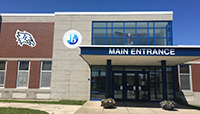Nurse's Office
Heather ClarkRN
Jordan-Elbridge High School
315-689-8510 x1010
315-689-3004 fax
hclark@jecsd.org
Meningococcal vaccine required for grades 7&12
New York state now requires students entering seventh and 12th grades to be vaccinated against meningococcal disease.
Does your child need to be vaccinated before the start of the school year to meet this requirement?
The answer depends on more than just your child’s age and grade level. When, or if, a child has previously been vaccinated for meningococcal disease will determine when shots will be necessary under the state’s new requirements that went into effect Sept. 1, 2016:
- One dose of meningococcal vaccine before seventh grade. If a student had the first dose as a sixth grader, then another dose is not required until grade 12.
- A total of two doses are required before grade 12. Most students entering grade 12 received their first dose when they were younger and will be due for their second dose, or booster. This booster is needed because protection from the vaccine decreases over time.
- The only teens who will not need a second dose before grade 12 are those who received their first dose on or after their 16th birthday.
Parents are encouraged to check with their children’s physicians prior to the start of the new school year to determine when or if they need to be vaccinated.
An approved law requires immunizations against meningococcal disease for children at ages 11 or 12 and again at 16 years of age or older, as recommended by the national Advisory Committee on Immunization Practices.
Students not up-to-date will not be allowed to attend school until they are vaccinated.
Meningococcal disease is a severe bacterial infection that can lead to meningitis (inflammation of the lining covering the brain and spinal cord) and bloodstream infections such as septicemia. Symptoms of the disease include a high fever, headache, vomiting, a stiff neck and a rash. The meningococcus bacterium is treatable with antibiotics, but each year it causes approximately 2,500 infections and 300 deaths in the United States. Those who contract the disease may experience permanent brain damage, hearing loss, kidney failure, loss of arms or legs, or chronic nervous system problems.
The Centers for Disease Control and Prevention has found the highest rates of meningococcal disease to be among preteens, teens, and young adults, as well as among infants with certain medical conditions. The new law targets many in this age group and aligns with the CDC’s recommendation to vaccinate 11- to 18-year-olds against meningococcal disease.
Hearing and vision screenings
The health office will be doing vision and hearing screens in the next few months. The nurse has to do them on all grade levels but 2nd if they didn’t have one done at the doctor. Kindergarten students don't need them if they were done last year.
WHEN TO KEEP A CHILD HOME WITH ILLNESS
It can be hard to know when to send children to school if they tell you that they do not feel well. Usually, the best place for them is in school, but there are some times when keeping them home to rest or call for an appointment with your health care provider is recommended.
|
Keep your child home and/or contact your child’s doctor for:
|
Children must stay home until they are fever-free for 24 hours without medication. If your child becomes ill at school and the school nurse feels they are too sick to benefit from school, and/or it could be contagious to other children, you or an emergency contact will be called to pick up your child.
If you find your child is frequently asking to stay home from school, if they are falling behind or appear anxious about school, or if there does not appear to be any physical symptoms, contact your school nurse and your health care provider to discuss your concerns.
Remind children to throw away used tissues, cover their mouths when they cough or sneeze, keep their hands away from their face, and to wash hands often with soap and warm water. These simple steps will help promote cleanliness and good health.
Immunization requirements
This is the current immunization requirements for school attendance
MMRP-K: 1 dose
K-12: needs 2 doses of MMR
Dtap
Pre-K: 4 doses
K-5: 5 doses or 4 doses if 4th dose was after age 4. Must have 1 dose after age 4 Or 3 doses if student was 7 years or older and the series started after age 1
6-12: 3 doses
Tdap
1 dose for entering 6th grade
Polio (OPV, IPV)
PK: 3 doses
K-4: 4 doses or 3 if 3rd dose received at 4 years or older. 1 dose must be given after age 4
Grade 5: 3 doses
Grades 6-9: 4 doses or 3 if 3rd dose received at 4 years or older. 1 dose must be given after age 4
Grades11,12: 3 doses
Hepatitis B
Pk-12: 3 doses
Varicella (chickenpox)
PK: 1 dose
K-4: 2 doses
Grade 5: 3 doses
Grades 6-9: 2 doses
Grades 11,12: 1 dose
Haemophilus influenza type b (HIB)
Required for Pre-K only 1 to 4 doses depending on dosing schedule
Pneumococcal Conjugate
Pre- K only 1-4 doses depending on dosing schedule.




